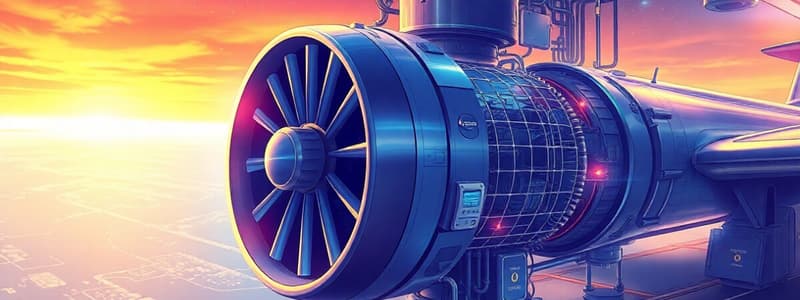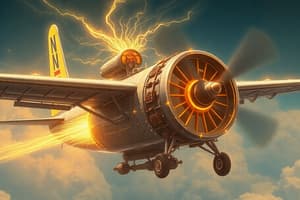Podcast
Questions and Answers
What is the primary frequency of the AC electrical system?
What is the primary frequency of the AC electrical system?
- 50 Hz
- 400 Hz (correct)
- 1000 Hz
- 60 Hz
What is the voltage of the DC electrical system?
What is the voltage of the DC electrical system?
- 28 V (correct)
- 12 V
- 200 V
- 115 V
How many engine-driven generators are part of the electrical power system?
How many engine-driven generators are part of the electrical power system?
- 1
- 3
- 2 (correct)
- 4
What is the maximum power output of each engine-driven generator?
What is the maximum power output of each engine-driven generator?
What is the main purpose of the Generator Control Unit (GCU)?
What is the main purpose of the Generator Control Unit (GCU)?
What is the purpose of the emergency generator?
What is the purpose of the emergency generator?
What type of power does the static inverter transform?
What type of power does the static inverter transform?
What is the output frequency of the AC power produced by the static inverter?
What is the output frequency of the AC power produced by the static inverter?
When will the static inverter automatically activate if only the batteries are supplying electrical power and the aircraft speed is above 50 knots?
When will the static inverter automatically activate if only the batteries are supplying electrical power and the aircraft speed is above 50 knots?
When will the static inverter activate if only the batteries are supplying electrical power and the aircraft speed is below 50 knots?
When will the static inverter activate if only the batteries are supplying electrical power and the aircraft speed is below 50 knots?
What is the power output of the static inverter?
What is the power output of the static inverter?
What is the maximum DC current each main transformer rectifier (TR 1 or TR 2) can provide?
What is the maximum DC current each main transformer rectifier (TR 1 or TR 2) can provide?
What is the primary function of the Battery Charge Limiter (BCL)?
What is the primary function of the Battery Charge Limiter (BCL)?
Under what circumstance would the ESS TR be used?
Under what circumstance would the ESS TR be used?
What components are directly connected to the hot buses?
What components are directly connected to the hot buses?
Flashcards
What is the primary function of the electrical power system?
What is the primary function of the electrical power system?
Provides AC power to the aircraft's electrical system.
What are the characteristics of the engine-driven generators?
What are the characteristics of the engine-driven generators?
They are driven by each main engine and can supply up to 90 KVA of three-phase 115/200 V 400Hz power.
What are GCUs and their functions?
What are GCUs and their functions?
Units that control the frequency and voltage of the generators and protect the network.
What is the function of the APU generator?
What is the function of the APU generator?
Signup and view all the flashcards
What is the purpose of the ground power connector?
What is the purpose of the ground power connector?
Signup and view all the flashcards
What are the functions of the GAPCU?
What are the functions of the GAPCU?
Signup and view all the flashcards
What is the role of the emergency generator?
What is the role of the emergency generator?
Signup and view all the flashcards
What are the functions of the emergency generator's GCU?
What are the functions of the emergency generator's GCU?
Signup and view all the flashcards
What are the conditions for the inverter to convert DC power to AC power?
What are the conditions for the inverter to convert DC power to AC power?
Signup and view all the flashcards
What type of power does the static inverter produce?
What type of power does the static inverter produce?
Signup and view all the flashcards
Where does the AC power generated by the inverter go?
Where does the AC power generated by the inverter go?
Signup and view all the flashcards
How does aircraft speed affect the inverter's activation?
How does aircraft speed affect the inverter's activation?
Signup and view all the flashcards
What are the conditions for the inverter's activation when the aircraft speed is below 50 knots?
What are the conditions for the inverter's activation when the aircraft speed is below 50 knots?
Signup and view all the flashcards
Transformer Rectifiers (TRs)
Transformer Rectifiers (TRs)
Signup and view all the flashcards
TR Entertainment
TR Entertainment
Signup and view all the flashcards
Batteries and BCLs
Batteries and BCLs
Signup and view all the flashcards
Battery Charge Limiter (BCL)
Battery Charge Limiter (BCL)
Signup and view all the flashcards
BCL Function
BCL Function
Signup and view all the flashcards
Study Notes
Aircraft Electrical Power System
- The system has a three-phase 115/200 V 400 Hz AC and a 28 V DC system.
- Electrical transients are acceptable for equipment.
- Commercial supply is secondary.
- Normal operation uses AC power.
- The system has 2 engine generators and 1 APU generator.
- Each generator can provide AC power to all bus bars.
- Some AC power is converted to DC for specific uses.
- Transformer rectifiers (TRs) supply DC power.
- Two main TRs (TR 1 and TR 2) supply up to 200 A of DC current.
- A third TR (ESS TR) powers the essential DC circuit from the emergency generator if main generators fail or if TR 1 or TR 2 fails.
- A fourth TR (TR Entertainment) powers the DC Entertainment bus for In-Flight Entertainment (IFE).
- If normal AC power fails, an emergency generator provides AC power.
- If all AC power sources fail, the system can invert DC power from batteries to AC.
- A static inverter transforms DC power from Battery 1 to 1 KVA of single-phase 115 V 400 Hz AC power. This power is then provided to part of the essential AC bus.
- The inverter automatically activates when the aircraft speed is above 50 kt, if only batteries supply power.
- The inverter activates at aircraft speeds below 50 kt if only batteries power the aircraft and both battery pushbuttons (BAT 1 and BAT 2) are on.
Engine-Driven Generators
- Two AC generators (GEN 1, GEN 2) provide power, one per engine.
- Each generator supplies up to 90 KVA of 115/200 V 400 Hz three-phase power.
- Generator Control Units (GCUs) control each generator's output.
- GCU functions include: frequency and voltage control, and protecting the network through associated generator line contactor control.
APU Generator and External Power
- A third generator (APU GEN) can replace either or both main engine generators.
- APU GEN supplies the same output as main engine generators.
- Ground power is available through a nosewheel connector to all busbars.
- A Ground Power Control Unit (GPCU) controls the external power contactor.
- A Ground and Auxiliary Power Control Unit (GAPCU) regulates and protects the network via the APU Electronic Control Box, controlling external power and APU line contactors.
Emergency Generator
- A hydraulic circuit drives an emergency generator.
- This generator supplies emergency AC power if all main generators fail.
- The emergency generator delivers 5 KVA of 115/200 V 400 Hz three-phase power.
- Its Generator Control Unit (GCU) maintains constant speed, controls output voltage, protects the network (with line contactor control), and controls start-up.
Batteries
- Two main batteries (each 23 Ah capacity) are connected to two hot buses.
- Each battery has a Battery Charge Limiter (BCL) to monitor and control charging and its contactor.
Studying That Suits You
Use AI to generate personalized quizzes and flashcards to suit your learning preferences.




